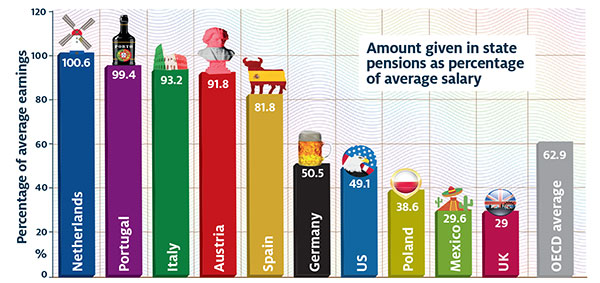Why lockdown lifting could force government’s hand to reform state pension triple lock
We explain why the government may make changes to the state pension triple lock.
15th June 2020 11:58
by Kyle Caldwell from interactive investor
We explain why the government may make changes to the state pension triple lock.

The easing of lockdown restrictions could lead to a bumper state pension increase by 2022 unless the triple lock is reformed, new analysis has found.
Number-crunching by Willis Towers Watson points out that one of the three measures used to determine the degree to which pensions are increased annually – the rate of earnings growth – could soar, due to the way it is calculated.
Under the triple lock first introduced in 2010 by the Conservative/Liberal Democrat coalition government, the state pension increases each year by the highest of three measures: inflation, the average earnings increase, or a minimum of 2.5%.
In regards to earnings growth, each year the government assesses how average earnings have changed over a certain period by comparing the three months to July with the same period a year earlier.
Willis Towers Watson points out that because millions of people have been furloughed in the three-month period that is examined, earnings growth is likely to be high in a year’s time.
David Robbins, senior consultant at Willis Towers Watson, explains: “Imagine that an employee had an annual salary of £25,000 and received the corresponding monthly pay cheques in May, June and July of 2019. Twelve months on, they have been furloughed and receive 80% of this, equivalent to £20,000 a year. Their pay reverts to £25,000 per annum when they return to work, and is still at this level throughout spring and summer 2021. The change in this individual’s pay is therefore -20% between May-July 2019 and May-July 2020, and +25% over the following year.”
He adds: “The experience of employees like this will feed into economy-wide average earnings growth. With 8.4 million employees furloughed, average earnings growth might be negative in 2020 and strongly positive in 2021.”
Figures from the Office for Budget Responsibility’s ‘V’ shape economic recovery analysis estimate that average earnings will fall by 7.3% in 2020 and rise by 18.3% in 2021. These numbers are for calendar years, but Robbins notes that if they also applied over the 12 months to May-July, under the triple lock system pensions would rise by 2.5% from the new tax year in April 2021 (provided inflation is along with wage growth lower than this), and then by 18.3% in 2022.
“Over a two-year period, triple-locked pensions would then have risen by 21.3% while wages grew by 9.7%. And to the extent that average pay growth reflects people moving from low wages to no wages, even people who remained employed would usually have seen their incomes rise by less than this,” says Robbins.
In 2020/21, the full basic state pension is £134.25 per week. Towers Watson calculates that under this path for average earnings, it would increase to £162.80 per week in 2022/23. Meanwhile, the new state pension would increase from £175.20 per week in 2020/21 to £212.45 per week in 2022/23.
To stop a bumper rise in the state pension from happening, the government would need to step in and make changes to the triple lock. Robbins adds: “To avoid increasing pensions in line with rebounding earnings, ministers would probably need to change primary legislation.”
- Scrap state pension triple lock to deal with ballooning deficit, says think tank
Robbins suggests that if ministers wanted to prevent the current policy from significantly and suddenly increasing the state pension relative to earnings, the government could freeze weekly pensions in April 2021 if earnings growth was negative.
In a similar ilk, Steve Webb, the former pensions minister and a partner at LCP, points out that a slump in inflation over the next couple of months could pave the way for changes to the triple lock.
For the inflation part of the triple lock calculation, the September reading of the consumer prices index is used. Analysis by LCP forecasts that unless there is a strong recovery in the economy, CPI inflation could be negative in September. Under this scenario, Webb notes the government will find it much easier to justify not increasing the state pension by the minimum 2.5% amount.
He says: “The 2017 Conservative manifesto floated watering down the triple lock, and there can be little doubt that the Treasury would like to see this commitment go. From the government’s point of view, a period of negative inflation when prices are actually falling would be the ideal time to justify not sticking to the 2.5% floor implied by the triple lock. Once the rule had been broken once, it would be more likely to be abolished for future up-ratings”.
This article was originally published in our sister magazine Money Observer, which ceased publication in August 2020.
These articles are provided for information purposes only. Occasionally, an opinion about whether to buy or sell a specific investment may be provided by third parties. The content is not intended to be a personal recommendation to buy or sell any financial instrument or product, or to adopt any investment strategy as it is not provided based on an assessment of your investing knowledge and experience, your financial situation or your investment objectives. The value of your investments, and the income derived from them, may go down as well as up. You may not get back all the money that you invest. The investments referred to in this article may not be suitable for all investors, and if in doubt, an investor should seek advice from a qualified investment adviser.
Full performance can be found on the company or index summary page on the interactive investor website. Simply click on the company's or index name highlighted in the article.